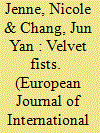|
|
|
Sort Order |
|
|
|
Items / Page
|
|
|
|
|
|
|
| Srl | Item |
| 1 |
ID:
147570


|
|
|
|
|
| Summary/Abstract |
Despite declaring the ASEAN Community to come into effect on 31 December 2015, ASEAN is not a security community. This article demonstrates this by firstly identifying three models of the security community, the Deutschian, the constructivist, and the instrumental models and subsequently applying these to ASEAN. Although the paradox of the ‘long peace’ of ASEAN seems to be validated by the latter, such is mistaking effect for cause. Through a process of critique, the shortfalls of the models are highlighted and consequently addressed through conjoining Critical Security Studies to the ‘security community’ concept in a Model IV critical security community formulation to achieve a holistic and comprehensive concept relevant to the world today. Employing this to assess ASEAN, the puzzle of whether ASEAN is a security community is laid to rest; its security is not truly comprehensive, its people are not emancipated, and its various domestic and transnational instabilities affect it adversely.
|
|
|
|
|
|
|
|
|
|
|
|
|
|
|
|
| 2 |
ID:
143658


|
|
|
|
|
| Summary/Abstract |
When Malaysia Airlines Flight MH370 disappeared from radar screens in the early hours of 8 March 2014, initial reactions suggesting that it was just another airliner disaster proved only partially correct. This article offers the interpretation that the multinational search effort for the missing Malaysian Boeing 777-200 airliner was revelatory of an abridged form of security competition among the mostly Pacific Rim states participating in both the post mortem and the search and rescue (SAR) operations. Although the Asia Pacific peace has been largely unbroken since the end of the Cold War, security competition among great powers, middle powers and weak states is still ongoing. In fact, this security competition is taking on proxy forms given the relative robustness of the overlapping architecture of Pacific Rim security regionalism in tamping down pressures for overt armed conflict to advance national security interests. MH370, following in the wake of the destruction wrought by natural disasters since the early 2000s, has provoked a competition in technological prowess in SAR operations, and more broadly, in quasi-civilian humanitarian assistance and disaster relief (HADR) capabilities amongst Pacific Rim states that have overlapping claims on the South China Sea and with interests in revising existing patterns of diplomatic order.
|
|
|
|
|
|
|
|
|
|
|
|
|
|
|
|
| 3 |
ID:
175556


|
|
|
|
|
| Summary/Abstract |
Defence diplomacy represents a notable paradox. On the one hand, it is a cooperative activity to build strategic and moralistic trust between states and thus positively shape the environment in which foreign policy is made. On the other hand, defence diplomacy also involves competition and demonstrations of military power, which may contravene its goal of building moralistic trust and undermine confidence between states. This article deals with the latter competitive realpolitik elements of defence diplomacy in terms of secrecy, swaggering, and shows of force that have largely been ignored in the literature. Building on a theoretical discussion of whether defence diplomacy works, the case of peacekeeping in Southeast Asia is analysed to illustrate how defence diplomatic activities produce effects contrary to their stated aims.
|
|
|
|
|
|
|
|
|
|
|
|
|
|
|
|
|
|
|
|
|